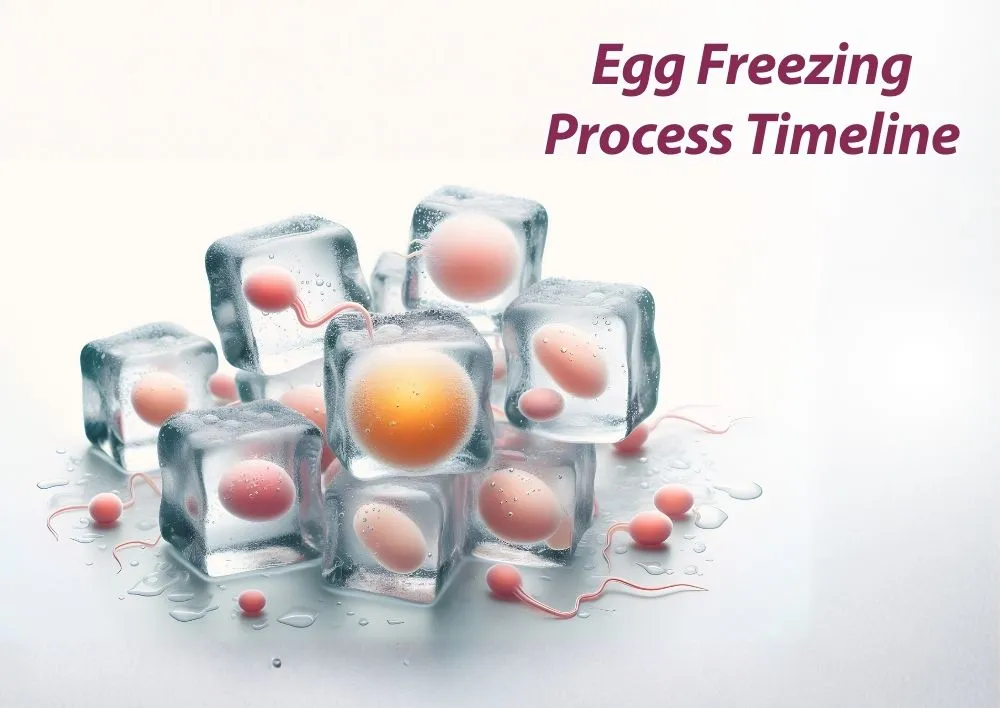What are The Benefits of Taking Folic Acid Before Conception for Women?
If you are considering starting a family or planning to conceive in the future, incorporating folic acid into your daily routine could be one of the best decisions for both you and your future baby. Folic acid, also known as vitamin B9, plays an important role in fetal development and overall maternal health. Now, let's explore the effective benefits of taking folic acid for women before conception.
Before initiating folic acid supplementation, it is important to seek your gynaecologists advice. They can guide the correct folic acid dosage and address any pregnancy-related concerns. For personalized recommendations and a tailored approach to your health, consider consulting with the experienced healthcare professionals at Miracles Apollo Cradle.
What is Folic Acid?
Folic acid, also known as vitamin B9, acts like a superhero for our bodies. This water-soluble vitamin plays an important role in various bodily functions, particularly in cell division and DNA formation. Especially before pregnancy, this unique vitamin is essential for our cells to stay healthy and function effectively.
Vitamin B9 is a synthetic form of folate found in various foods. The primary function of folic acid is the synthesis of DNA, the production of red blood cells, and the repair of damaged DNA. For women who are pregnant or planning to conceive, incorporating folic acid into their daily routine is crucial. It should begin before conception and continue for at least three months afterward.
Benefits of Taking Folic Acid For Women Before Conception
Folic acid tablets are commonly used for various health purposes. Here are some functional benefits of folic acid before conception.
-
Prevention of Birth Defects: One of the most crucial benefits of folic acid is its role in preventing birth defects, particularly neural tube defects (NTDs). Neural tube formation begins in the first weeks of pregnancy, often before a woman realizes she is pregnant. Taking folic acid before conception provides essential supplements, reducing the risk of serious birth defects affecting the baby's brain and spine.
-
Reduced Risk of Congenital Abnormalities: Folic acid is not only linked to a lower risk of neural tube defects but also to other congenital abnormalities. It plays a vital role in the development of the baby's heart, palate, and other organs. Adequate folic acid levels contribute to the proper formation of the baby's genetic material and cellular structure.
-
Support for Both Partners: Folic acid benefits not only women but also men. For couples trying to conceive, preconception health is crucial for both partners. Folic acid has been associated with improved sperm quality, including increased sperm count and motility, enhancing the chances of successful fertilization.
-
Preeclampsia Prevention: Women taking folic acid before conception may experience a reduced risk of developing preeclampsia during pregnancy. This serious condition is marked by high blood pressure and potential organ damage. Folic acid supports proper blood vessel function, contributing to this protective effect.
-
Maternal Well-being: Folic acid is not solely for preventing birth defects; it also plays a role in maintaining the overall health of the mother. Adequate levels reduce the risk of anemia, common during pregnancy, and support red blood cell production, preventing certain types of anemia.
-
Enhanced Fertility: For couples facing fertility challenges, folic acid can contribute to regulating the menstrual cycle and supporting healthy ovulation in women, increasing the likelihood of successful conception.
Advantages of Folic Acid in Pregnancy
Folic acid helps support a healthy pregnancy, and it has numerous advantages. Here are some key importance of folic acid during pregnancy
-
Neural Tube Development: One of the most well-known benefits of folic acid for women during pregnancy is its crucial role in the early development of the baby's neural tube, which later becomes the brain and spinal cord. A sufficient amount of folic acid before and during early pregnancy reduces the risk of development of neural tube defects, such as spina bifida and anencephaly.
-
Prevention of Birth Defects: In addition to preventing neural tube defects, folic acid contributes to averting other birth defects, including heart defects and certain limb abnormalities. Adequate levels of folic acid are instrumental in the proper formation of the baby's organs and structures.
-
Reduced Risk of Premature Birth: Folic acid has been linked to a decreased risk of premature birth. This is crucial, as premature birth can lead to various health issues for the baby. Folic acid helps promote a full-term pregnancy.
-
Maternal Health: Folic acid benefits not only the baby but also the mother. It aids in preventing anemia during pregnancy by supporting the production of red blood cells. Maintaining healthy levels of red blood cells is vital for carrying oxygen to both the mother and the developing baby.
-
Preeclampsia Prevention: Adequate folic acid intake may help reduce the risk of preeclampsia, a condition characterized by high blood pressure and potential complications for both the mother and the baby.
-
Cell Division and DNA Synthesis: Folic acid plays a crucial role in cell division and DNA synthesis, functions that are highly active during pregnancy as the baby grows and develops. Ensuring a sufficient supply of folic acid supports these fundamental processes.
When To Start Taking Folic Acid?
You should start taking folic acid before you conceive, as its benefits are most significant in the early stages of pregnancy when the neural tube is forming. Taking folic acid is part of a healthy preconception plan, which includes maintaining a well-balanced diet, engaging in regular exercise, and making other healthy lifestyle choices to support overall reproductive health. Consulting with a gynecologist helps get guidance on the timing and dosage of folic acid based on your unique circumstances.
-
Before Conception: Start taking folic acid at least one month before actively trying to conceive. Since neural tube defects usually develop in the first few weeks of pregnancy, having sufficient folic acid in your system before conception is important. Many pregnancies are unplanned, so if you're of childbearing age and sexually active, it's good to take folic acid regularly.
-
Continuous Supplementation: Continue taking folic acid throughout the early weeks of pregnancy to ensure sufficient levels during the critical period when the neural tube closes within the first 28 days of pregnancy, usually before many women realize they are expecting.
-
Planning for Pregnancy: If you are actively planning for pregnancy, consider taking a prenatal vitamin daily that includes folic acid. Prenatal vitamins are formulated to provide essential nutrients, including folic acid, that support a healthy pregnancy. Consult with your gynecologist to determine the folic acid tablets for pregnancy and their appropriate dosage for your specific needs.
-
High-Risk Factors: If you have specific risk factors, such as a history of neural tube defects in a previous pregnancy, certain medical conditions, or if you're taking medication that interferes with folic acid absorption, your gynecologist might recommend a higher dosage or additional supplementation.
-
During Pregnancy: If you didn't start taking folic acid before conception, you can start when you know you're pregnant. However, the impact on preventing neural tube defects is most effective when started before conception.
-
Under Medical Guidance: Always online consult with your female gynae doctor before starting any supplementation, including folic acid. They can provide personalized advice based on your health history, ensuring that you take the right dosage for your individual needs.
How Much Folic Acid Should I Take?
The recommended dosage of folic acid can vary based on factors such as age, pregnancy status, and specific health concerns. It's crucial to consult with your gynecologist before initiating any supplementation, as individual needs can differ. Your gynecologist can assess your specific situation, take into account any existing health conditions, and offer personalized recommendations regarding the appropriate dosage of folic acid for you
Does Folic Acid Cause Any Side Effects?
Folic acid is generally considered safe when taken at prescribed doses. However, as with any supplement or medication, there can be potential side effects, though they are typically associated with high doses.
Here are some considerations:
-
Digestive Issues: In some cases, high doses of folic acid can lead to digestive issues such as nausea, bloating, gas, and a decrease in appetite.
-
Allergic Reactions: Allergic reactions to folic acid are extremely rare but can include symptoms like itching, swelling, severe dizziness, or difficulty breathing.
-
Interaction with Medications: Folic acid supplements might interact with certain medications. For example, excessive folate supplement intake can cause symptoms of vitamin B12 deficiency that require medical care.
-
Risk of Overdose: Too much folic acid can lead to adverse effects. The daily recommended dose of folic acid varies by age and life stage, so it's important to consult a gynecologist for expert advice on the dose of folic acid.
-
Unmetabolized Folic Acid: In some cases, the body might not effectively metabolize folic acid, leading to its collection in the bloodstream.
If you are considering taking folic acid supplements or any other vitamins, it's recommended to consult with the best gynecologist near you. They can provide personalized advice based on your health history, potential interactions with medications, and specific needs. Always follow the recommended dosage and guidelines to ensure the safe and effective use of folic acid.
What are The Natural Food Sources of Folic Acid?
Folic acid, also known as folate when found in food, is naturally present in many foods. Here is a list of natural food sources of folate:
1. Leafy Green Vegetables:
-
Spinach
-
Kale
-
Collard greens
-
Romaine lettuce
-
Broccoli
2. Citrus Fruits:
-
Oranges
-
Grapefruits
-
Lemons
-
Limes
3. Avocado: A good source of folate and provides other essential nutrients.
4. Asparagus: This vegetable is rich in folate.
5. Brussels Sprouts: Not only a good source of folate but also provides other vitamins and minerals.
6. Beets: Beets, including their greens, are a nutritious source of folate.
7. Bananas: Provide a small amount of folate along with other essential nutrients.
8. Sunflower Seeds: A good source of folate, as well as healthy fats and proteins.
Conclusion:
In conclusion, incorporating natural sources of folate into your diet or considering supplements recommended by a gynecologist offers several benefits for a healthy pregnancy. Ensuring adequate folic acid intake, whether through diet or supplements, is a crucial step toward giving your baby the best start in life. Consult with a gynecologist to determine the appropriate dosage and address individual health needs. By prioritizing preconception health, would-be parents can set the stage for a healthier journey into parenthood.
Miracles Healthcare is recognized as the best gynecology hospital in Gurgaon. Our team of highly experienced gynecologists and obstetricians is renowned for their clinical skills and comprehensive understanding of pregnancy care. We follow a holistic treatment approach to ensure women visiting us can have a healthy pregnancy that results in a beautiful baby.
For personalized advice and quality care, schedule a online consultation with our expert team today.
Frequently Asked Questions
Yes, taking folic acid at least three months before conception helps prevent birth defects and supports healthy fetal development.
Maintain a balanced diet, start prenatal vitamins including folic acid, stay active, manage stress, and consult a gynecologist for a preconception check-up.
The ideal time is at least 3 months before trying to conceive and continuing through the first trimester of pregnancy.
Folic acid doesn't directly cause twins, but some studies suggest it may slightly increase the chances in some women, especially when combined with fertility treatments.
Prenatal multivitamins with folic acid (400–600 mcg), iron, vitamin D, B12, and iodine are ideal; consult your doctor for personalized recommendations.
Folic acid supplements with 400–600 mcg daily are recommended; look for pharmaceutical-grade products approved by health authorities.
People with certain medical conditions, like vitamin B12 deficiency or those with MTHFR gene mutations, should consult a doctor before taking folic acid.
Miracles Apollo Cradle, Gurgaon, is one of the best maternity hospitals, known for expert obstetricians, advanced facilities, and personalized pregnancy care.



.webp)











Was the information useful?
0 0